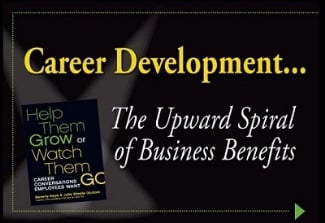I was fortunate enough to be  part of an engaging peer networking book discussion this morning at Goodwill, hosted by Executive Learning Exchange, centered around the book Help Them Grow or Watch Them Go, Career Conversations Employees Want (2012, Kaye & Giulioni).
part of an engaging peer networking book discussion this morning at Goodwill, hosted by Executive Learning Exchange, centered around the book Help Them Grow or Watch Them Go, Career Conversations Employees Want (2012, Kaye & Giulioni).
A main takeaway for me is a need to shift the mindset that career development of your employees is the most important requirement for anyone who manages people. Many excuses exist why executives through managers don’t do a better job in this area, including:
- It’s difficult, period. It takes time, energy, and a willingness to create the conditions (via education, exposure, and experience) to support one’s career development.
- It’s difficult to measure. Tracking output, financials, or customer service scores are more tangible than measuring the impact of a brief coaching moment, a crucial conversation, or a stretch assignment.
- Each individual is unique. We must take the time to understand an employee’ values, motivations, and skills, and match that to the future state business needs.
- Middle managers are being squeezed. Executives ask middle managers for many things, more growth, managing to a budget, achieving high customer service scores, and retaining/developing top talent. Do more with less.
- We are not well trained in this competency; it’s something that develops over time with experience or if someone is lucky enough to work with a strong mentor. Some never develop this competency.
It all starts with having a mindset that your employees are people and helping them develop is a core requirement of all executives and managers. Once you have that mindset, you begin to focus on how to build trust through each interaction. When trust is established, anything is possible. A flip side to not investing in your employees was summed up by one of the attendees. A CFO says “What happens if we invest in developing our people and then they leave the company?” CEO answers, ‘What happens if we don’t, and they stay?”. Think about that for a moment.
Investing in your employees produces bottom line results. It leads to a more engaged workforce who is more productive, innovative, and loyal, which drives exceptional customer service and growth. As a Workforce Development organization ourselves, we have many lessons learned and remain committed to our own journey. In addition, we have worked with other companies on their own journey. Contact us to discuss how we can help you.
A link to a video synopsis can be found here.
To learn more, email me at dan.depies@goodwillsew.com or via Twitter @DanDepies











